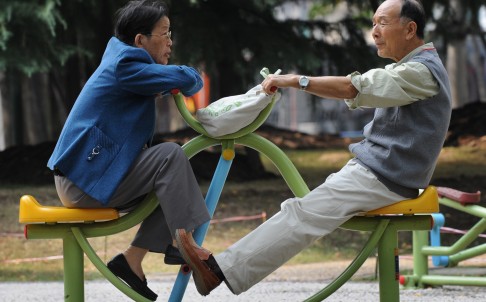
As we age, the centre of activity in our brains shifts from the back to the front, the largest ever study of its kind has revealed, giving scientists a better understanding of the effects of ageing and opening up the potential to slow down the process.
While growing older does take its toll on the brain, the effect may have been overstated, according to Li Huijie of the Chinese Academy of Sciences' Institute of Psychology.
"Ageing has a negative impact on the brain, but it is not as bad as we thought," he said.
That conclusion came from the largest brain scan analysis of the effects of ageing ever carried out.
 |
|
An elderly couple exercises in Shanghai, China. Scientists have discovered that mental activity shifts to the front of the brain as we age. Photo: AFP |
In the journal Neuroscience and Biobehavioural Reviews, the researchers detailed their findings based on the reexamination of magnetic resonance imaging (MRI) data collected on nearly 4,000 volunteers since 2003 by brain scientists around the world.
The general decline of brain activity with age has been observed for a long time, but some older people retain minds as sharp as when they were young, a fact that has puzzled scientists for decades.
In a meta-analysis of 2,035 subjects over 60 years old and 1,845 between 18 and 35, scientists confirmed the observation from previous small scale studies that activity in the frontal lobes of the brain increases with age.
Older subjects better able to learn new things and make split-second "go or no go" decisions all had a more active frontal area, while the rear of their brain was relatively quiet, the opposite of what is seen in younger people.
The shift in thinking from back to front does not come without sacrifice. As the bulk of visual information processing is carried out by the occipital regions in the back of the head, older people inevitably lose some related capabilities such as colour differentiation and motion perception, so don't expect to see any sexagenarian Formula One drivers or fighter pilots.
But just as some blind people can develop exceptionally strong hearing, older brains compensate for the loss of perception in the back of the organ with increased activity at the front, Li said.
The frontoparietal network is important for executive functions, such as multitasking, decision making and self-control.
Li's team spent three years examining more than 10,000 studies to find suitably comprehensive data for their meta-analysis.
That effort was worthwhile however.
"We found strong evidence that the key to solving problems associated with brain ageing lie in the forehead," he said.
"This may shed light on the development of new therapies and medications to slow down decline."
The study also found that as people age, they increasingly use the default network, the part of the brain most active when a person is doing nothing at all. This explains why elderly people are more comfortable "idling" than impatient youths.
While the Chinese god of old age, Shou Xing, had an exceptionally large forehead, Li said the study did not support the traditional notion that elderly wisdom was linked to forehead size.
"An active front [of the brain] does not mean a physically large forehead," he said. "The difference cannot be seen from the outside."
The scientists have developed new software to carry out the unprecedented large scale analysis, but the program is still far from perfect, its creators said.
Factors such as age, gender, task difficulty, sample size and even grey matter density could all introduce bias to the results. The researchers said they were working to improve the algorithms for greater accuracy.
Li's team's findings have raised some new questions about the ageing of the brain.
For instance, some older people with hyperactive foreheads do not see a correspondingly better mental performance, something which left the researchers scratching their heads.
"No existing theory can fully explain the phenomenon we saw in this study. We still have some gaps in our knowledge and understanding of this sophisticated process," Li said.
"The brain may try to fight the effects of ageing, but the lone fighter has their limits."
Problems associated with ageing are particularly pertinent in China, Li said.
"China has the world’s largest ageing population. Developing new technology and medicines to slow down the ageing of brains will be very important to our economic and social development.” (South China Morning Post)

86-10-68597521 (day)
86-10-68597289 (night)

52 Sanlihe Rd., Xicheng District,
Beijing, China (100864)

